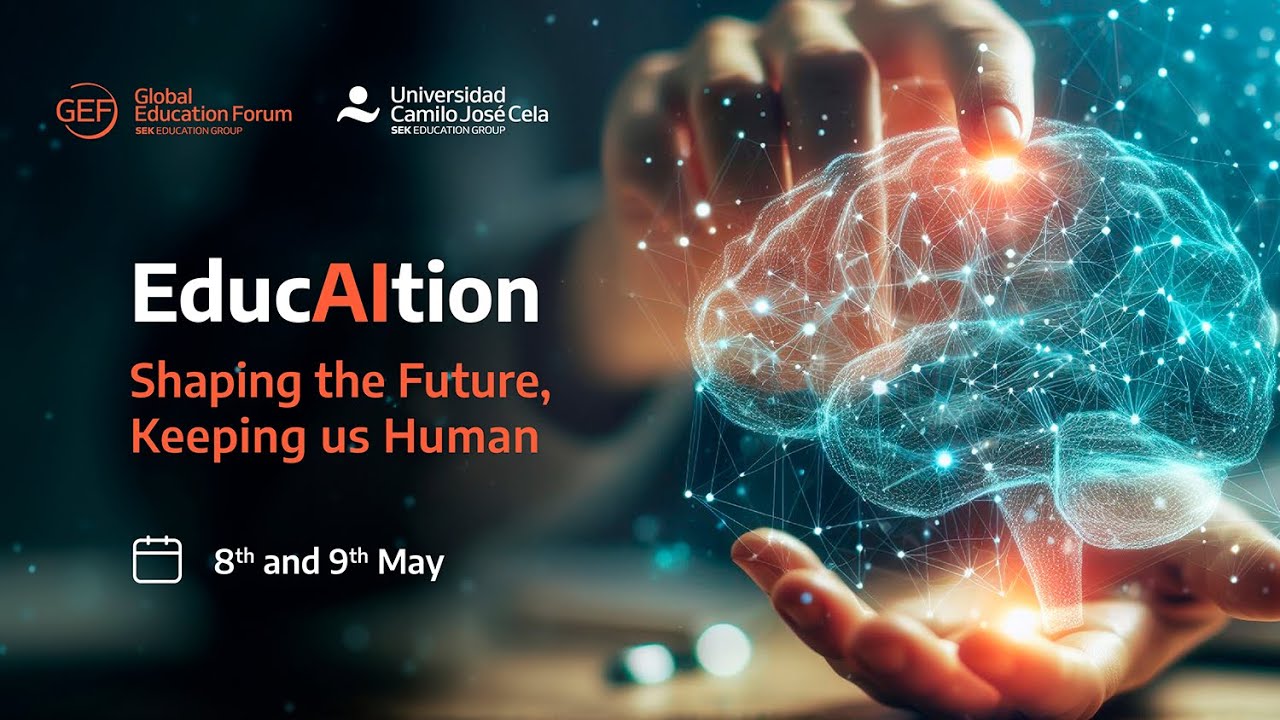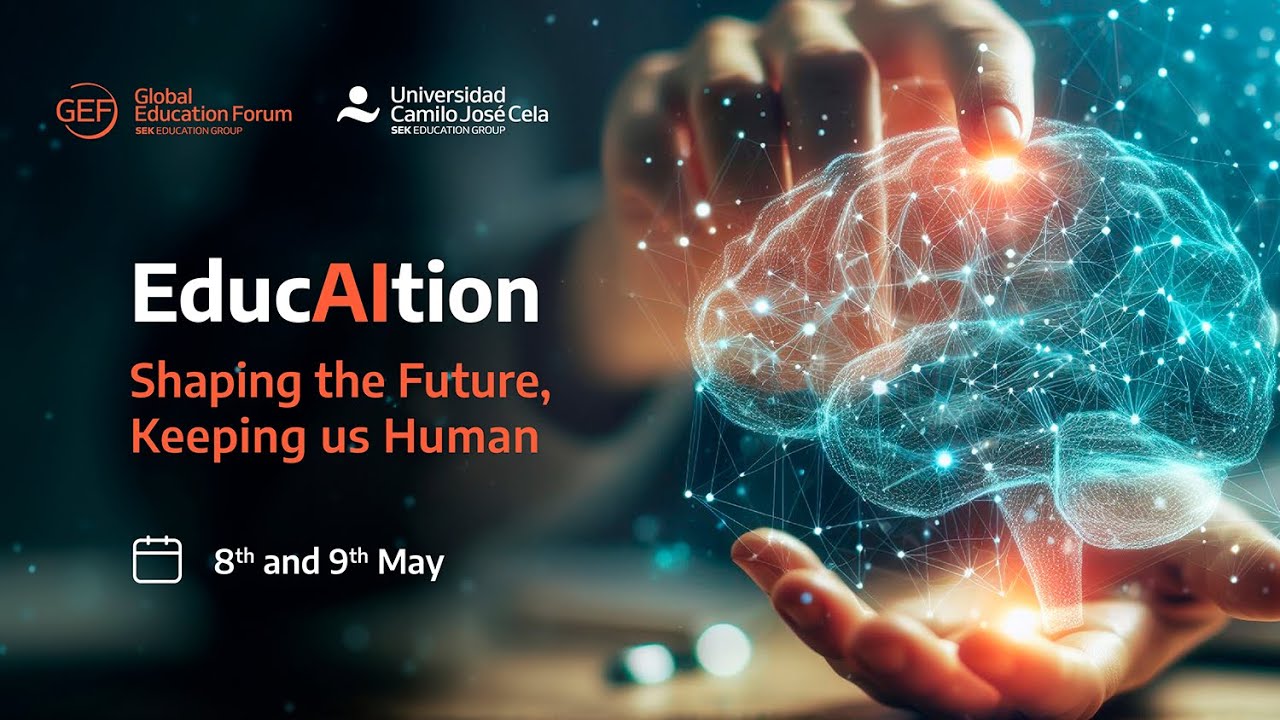GEF Madrid 2024: AI, Enhancing Digital Safety in Schools?
Summary
TLDRThe panel discussion, featuring experts from diverse educational backgrounds, delves into the impact of AI in schools. Concerns are raised about students' over-reliance on AI, potentially undermining learning and human connection. The panel emphasizes the importance of establishing guidelines and guardrails for ethical AI use, considering teacher-student relationships and pedagogical soundness. The conversation highlights the need for benchmarks that assess AI tools' appropriateness for educational contexts and stresses the importance of human interaction and well-being in learning.
Takeaways
- 🌏 Stuart Mitchell from Educational Services Australia emphasizes the importance of the national task force for the safe and responsible use of AI in schools and the development of the Australian framework for ethical AI use in education.
- 🏫 Joe Clement and Matt Miles, high school teachers and authors, express skepticism about the impact of AI and technology in classrooms, highlighting the potential for misuse and the importance of teachers' experiences in policy discussions.
- 🤔 Jeff Bradley, former Director of the commission on International Education, stresses the need for a shared understanding of the purpose of school before implementing AI tools, and the importance of guidelines and guardrails for AI use in education.
- 👥 French, President of the Federation for European education, discusses the need to focus on the relationship between teachers and students, the importance of citizenship skills, and the potential impact of AI on the role of teachers.
- 📊 Maria Jose Oando, representing a UK-based education consultancy, talks about the need for benchmarks that focus on pedagogy and the appropriateness of AI-generated content for different age groups in education.
- 🔒 The panel agrees on the challenge of ensuring AI applications are designed ethically, considering student well-being, transparency, and explainability, especially given the 'black box' nature of AI technology.
- 👨🏫 There is a consensus on the crucial role of teachers in the implementation of AI, with a focus on the socio-emotional and cultural aspects of education that AI cannot replace.
- 📉 The discussion points out the potential negative impacts of technology on students' well-being, with increased rates of depression, anxiety, and loneliness correlating with the rise of digital devices.
- 🛑 The panel calls for caution and careful consideration of the risks associated with AI in education, advocating for policies and practices that prioritize student well-being and ethical use.
- 🌐 The conversation highlights the global nature of the AI in education discussion, with perspectives from Australia, the United States, Europe, and the developing world.
- 🚧 The panel suggests that while AI has the potential to automate tasks and improve educational processes, its implementation must be managed with clear policies and an understanding of its limitations in enhancing learning and teaching.
Q & A
What is the name of the organization Stuart Mitchell represents?
-Stuart Mitchell represents Educational Services Australia, a not-for-profit company owned by the ministers for education in Australia.
What was the role of Stuart Mitchell in the national task force for the safe and responsible use of AI in schools?
-Stuart Mitchell had the privilege of being part of the national task force for the safe and responsible use of AI in schools, where he played a part in the development of the Australian framework for the safe and ethical use of AI in schools.
What is the perspective of Joe Clement and Matt Miles on educational technology?
-Joe Clement and Matt Miles, who are high school teachers and co-authors of the book 'Screen Schooled', consider themselves as Tech Skeptics. They express concerns about the overuse of screens and technology in classrooms and their potential negative impact on student learning.
What is the concern expressed by the panelists about AI in education?
-The panelists express concerns about the potential misuse of AI, such as students relying on it to take shortcuts in learning, and the lack of understanding of AI's role in education. They also discuss the importance of having a shared understanding of the purpose of schooling before integrating AI tools.
What does Jeff Bradley emphasize as a fundamental question regarding AI in education?
-Jeff Bradley emphasizes the need for a shared understanding of what school is for, suggesting that the purpose of schooling should be agreed upon before discussing the integration of AI tools in the educational system.
What is the role of the AI for Education.org initiative as described by Maria Jose Oando?
-The AI for Education.org initiative, led by Maria Jose Oando, focuses on building AI tools and products for developing countries in sub-Saharan Africa and East Asia. The initiative ensures that these tools are pedagogically sound and relevant for the context of developing countries.
What challenges does Educational Services Australia face in implementing guard rails for AI applications?
-Educational Services Australia faces challenges in assessing whether an AI application is designed ethically, considering student well-being and rights, and dealing with the 'black box' nature of AI technology, which lacks transparency and explainability.
What is the importance of the teacher-student relationship according to the panelists?
-The panelists stress the importance of the teacher-student relationship for enhancing learning outcomes and digital safety. They argue that this relationship should be at the center of educational practices, especially in the context of AI integration.
What is the potential impact of AI on the role of teachers, as discussed by the panel?
-The panel discusses the potential for AI to change the role of teachers, with concerns that AI could replace teachers or reduce them to mere assistants. There is a call to strengthen the teacher-student relationship and protect teachers' jobs in the face of AI integration.
What does Claude compare the current situation of AI in education to, and what is the lesson to be learned?
-Claude compares the current situation of AI in education to the advent of social media, which started with great promise but has had unforeseen negative impacts. The lesson to be learned is the importance of implementing guard rails and guidelines to ensure the safe and positive use of AI in schools.
What is the purpose of the 'Responsible Artificial Intelligence for Learning' (RAIL) developed by the Middle States Association (MSA)?
-The RAIL developed by MSA is a set of protocols and standards that schools need to meet and adhere to in order to receive a credential indicating they are properly managing and using AI in education. It includes safeguards and requires schools to have policies on the treatment of AI technology.
Outlines

This section is available to paid users only. Please upgrade to access this part.
Upgrade NowMindmap

This section is available to paid users only. Please upgrade to access this part.
Upgrade NowKeywords

This section is available to paid users only. Please upgrade to access this part.
Upgrade NowHighlights

This section is available to paid users only. Please upgrade to access this part.
Upgrade NowTranscripts

This section is available to paid users only. Please upgrade to access this part.
Upgrade NowBrowse More Related Video
5.0 / 5 (0 votes)





